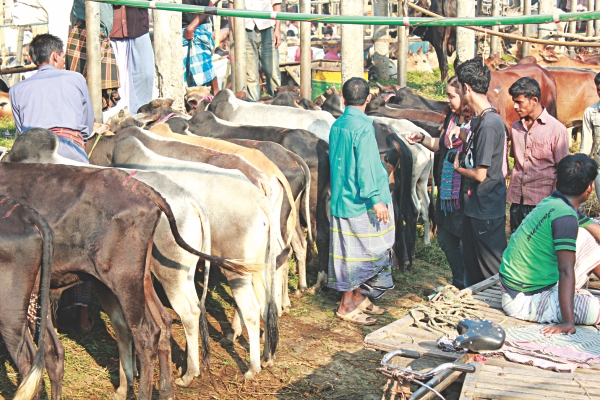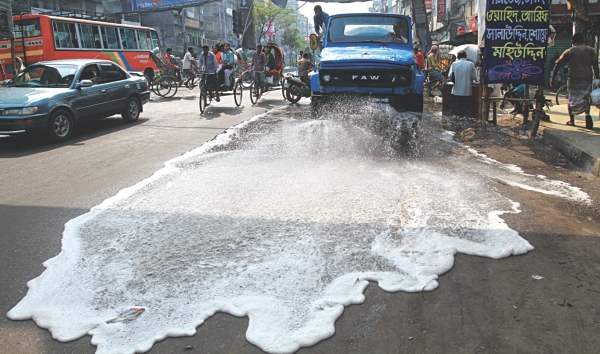| Experience
The Students' Say
Promiti Prova Chowdhury
Qurbani or Eid-ul-Adha is knocking on the door. Everyone is ready with unique preparations and plans regarding Eid. But there are a few points, if addressed, might make your Eid a more healthy and enjoyable one, overall. Let's see what the students have to say…

PHOTO: KAZI TAHSIN AGAZ APURBO
Roads of Dhaka city are quite narrow and congested. So keeping them clean throughout the year is a challenge indeed, let alone the qurbani (sacrifice of animals during Eid-ul-Adha) eve. Abrar, a student of Chittagong University says, "Nowadays Chittagong is no different than Dhaka in terms of the road condition after qurbani takes place. Moreover the dustbins we have are not a smartly built.They are like open boxes and most of the time we just throw our litters somewhere nearby them but not inside them. So even if the filth of the sacrificed animals are brought there, they smell bad and look really horrible because they are not stocked up inside."
Ovi, who is almost done with his bachelors in Business at North South University, reminisces his early days passed at Ghorashal, Narsingdi where qurbani happened to be quite clean and quick course of task due to proper management. "In Dhaka, every area should have a specified spot where all the sacrificial animals will be brought, the butchers will slaughter, meat will be distributed and after all these are done, the owners will carry their portions back home from the spot," suggests Ovi.

After qurbani cleaning should be everyone's resposibility along with City Corporation. Photo: Star
Do the sacrificial animals define one's status? “Well, unfortunately today it has become like that,'' says Sadia, a student of Media Studies and Journalism at University of Liberal Arts Bangladesh (ULAB). “If you believe in the teachings of Eid-ul-Adha according to Islam, buying bigger and pricier can never be symbols of status. Some people buy animals and compete with each other in terms of price and size which is a not a healthy practice at all.” Another student of the same batch Ashraf, vexes, “Qurbani is about sacrifice. Price is not a factor here. If someone does that, it only reflects his narrow mindedness.” Regarding the condition of roads during qurbani, Sadia says, “Cleaning the roads should not be the responsibility of City Corporation solely. It is the responsibility of each and every individual who is using the roads for qurbani. Also a matter of finance is involved here. As we all know that ultimately there will be a mess after the slaughtering it is better to take measures beforehand. Families living in a particular community or area should discuss and make a plan.”
Nadim, a student of Computer Science and Engineering at United International University says, “Eid should be for everyone. In our country it is seen that those who have plenty of riches buy as many animals as they want to include camels and sheep. But many people cannot even think of buying one. It looks anomalous. Moreover in the west, during Christmas prices of commodities fall whereas here it flies up like a rocket. So Eid becomes almost unreachable for the poor.”
Piyal, a student of Business at ULAB shares the extreme amusement he derives from the company of his friends in Bhola, Barisal. Apart from going to relatives' places and eating beef, they go to the well-known “Monpura” island to have the famous yogurt available there. They hire a trawler to reach there and during the journey they catch fish and fry them inside the trawler. “To go fishing with friends on Eid and frying the fish right there is enthralling!” says Piyal passionately. He wishes everyone to enjoy Eid in such unusual yet healthy manner.
Japan Garden City, a housing complex at Muhammadpur of the capital comprises of 1300 apartments (approximately). Lata, a resident of Japan Garden City and a final year student of Psychology at Dhaka University says, “One can well imagine what the compound of Japan Garden looks like the night before Eid. If every family residing here buys even one cow, it becomes a mini 'Gorur Haat'. I cannot even sleep due to the roars of animals. But the surprising fact is that in the morning right after prayers, qurbani starts and within 2 in the afternoon the whole compound is neat and clean without the slightest patch of blood or stink in the air. This happens just because of the pre-planning and cooperation of the central committee at our housing complex. The fund comes from the maintenance charge that we give throughout the year. Holes are made at different corners of the compound and all the filth is buried there.”
So let us all come together and keep our city and roads healthy and clean to have a joyous Eid. Eid Mubarak!
| 